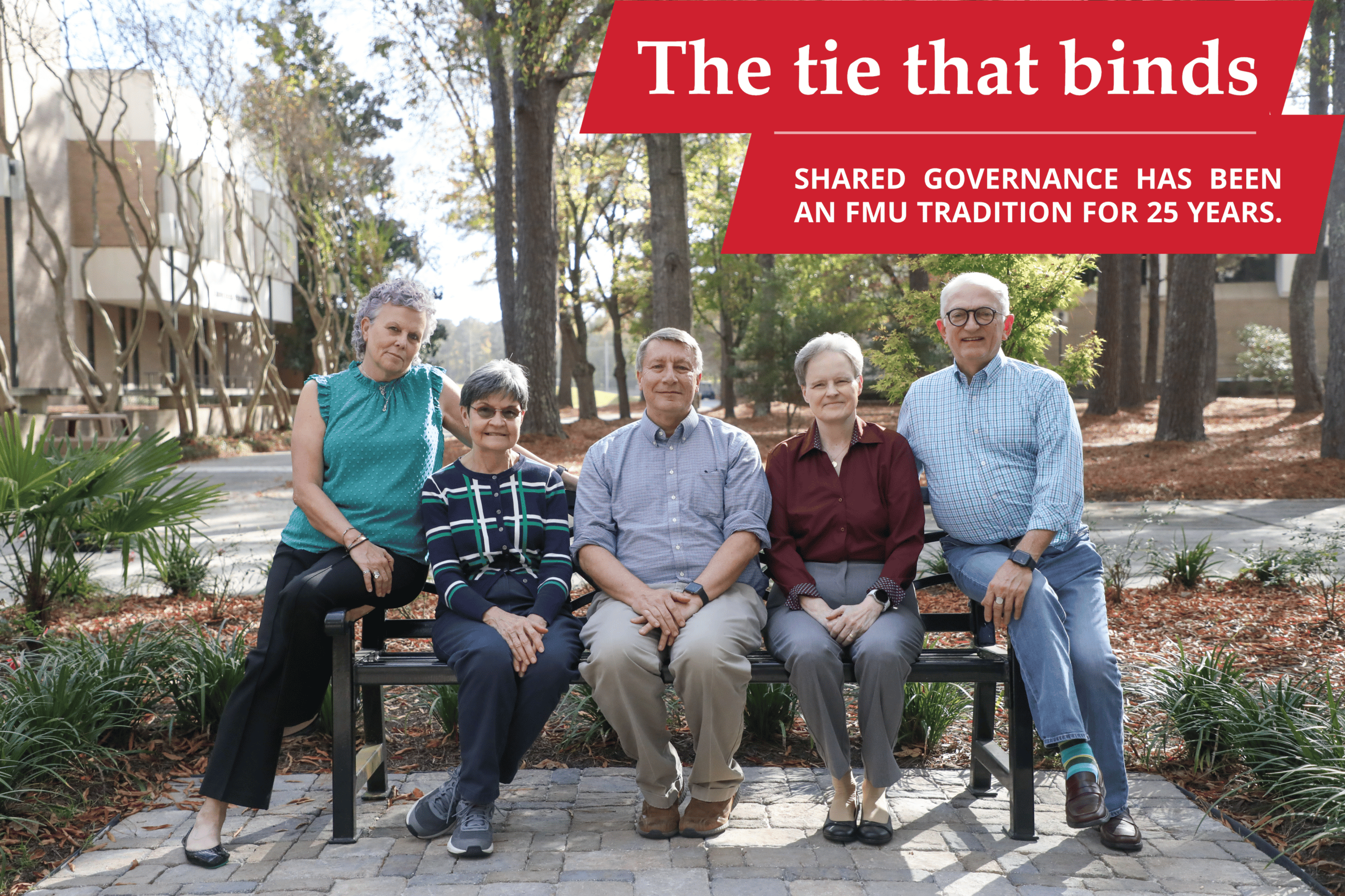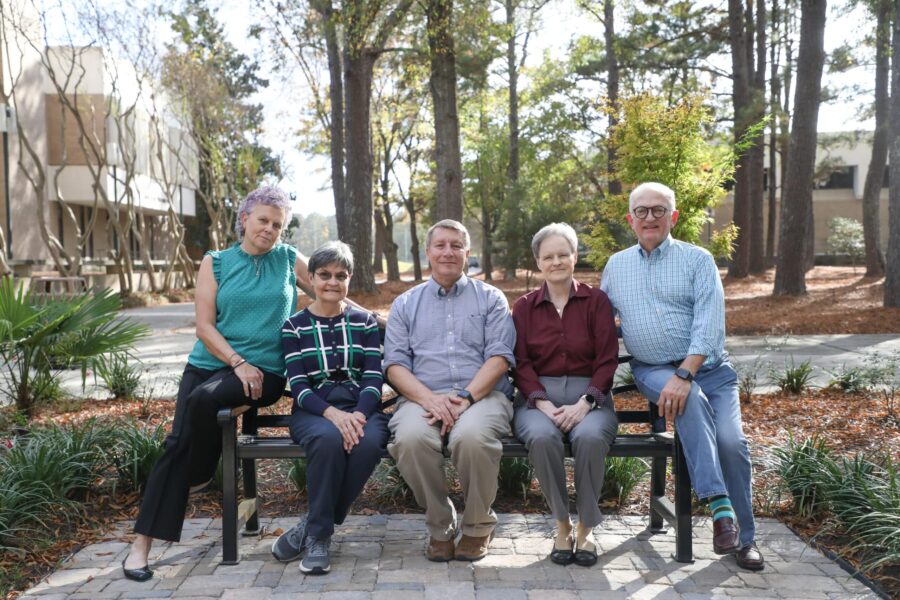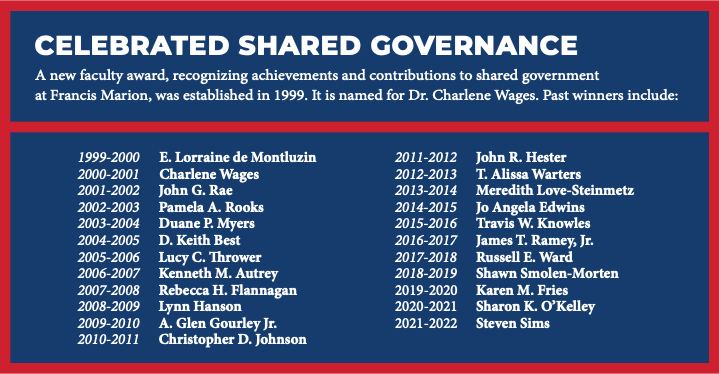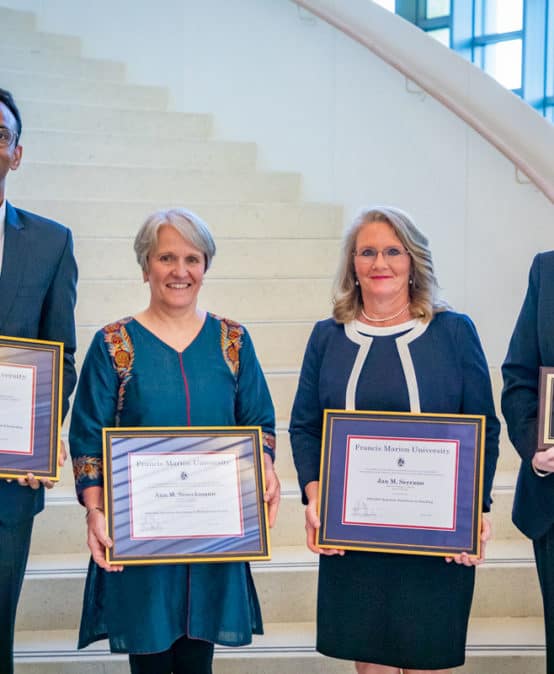November 11, 2022

The Tie That Binds
The Tie That Binds
By Anna Kathryn Strom | November 2022 | FMU Focus Magazine Fall/Winter 2022

Shared governance is the oil that lubricates the operation of a university. Behind the scenes, in the recesses of the great academic machine, it quietly does its job, making everything run smoothly.
Out of sight, and out of most people’s minds, it is seldom noticed — unless it’s gone.
Long-time denizens of Francis Marion University know this all too well. Three decades ago, FMU had no working arrangement for the shared responsibilities between faculty and administration. The resulting chaos demoralized faculty and put the institution in dire straits. Enrollment faltered. Decision-making went off the rails. The university found itself on the American Association of University Professors’ censure list.
“It was a bleak time around here,” says Dr. Charlene Wages, a long-time FMU faculty member who is now the university’s vice president for administration. “It wasn’t clear what the future held.”
A new president, the current one, Dr. Fred Carter, arrived in 1999. Among his first acts was to encourage the development of a new faculty constitution, built on the principle of governance shared between the faculty and the administration. Living by that framework has been one of the hallmarks of this administration’s tenure at FMU, and it has shaped the university’s strong growth over the past decades.
FMU will celebrate — quietly, of course— 25 years under the new constitution next year. It’s a landmark by any measure, says Carter.
“Anybody who really understands how a university works understands the value of the principle of shared governance,” says Carter. “Universities that have a strong tradition in that area just work better. Decisions are better. Programs are better. The quality of your people is better, because good people want to work at a place that embraces those values. That was obvious 25 years ago and it’s still obvious today.”

The Key Word Is ‘Shared’
Shared governance refers to the process and policies created to ensure that every segment of the university community — faculty, students, governing boards, administrators — have input in the decision-making and strategic governance of the university. That includes carefully defining roles and responsibilities.
Welcoming faculty into the process is a critical part of that. During the past 25 years, the university has enjoyed stable and consistent faculty leadership. Carter, a political scientist with a significant pedigree as an academician and faculty leader himself, has enhanced that profile by regularly bringing talented faculty into formal administrative roles at the university. Dr. Chalene Wages, the long-time VP of administration, is just one of many examples.
FMU’s faculty governing body is organized into two committees, the Academic Affairs Committee and the Graduate Council. Representatives from these two councils bring issues and proposals to the Faculty Senate, which is headed by the chair of the faculty. The chair of the faculty represents all faculty before the administration and is a member of Carter’s senior staff.
The chair’s foremost role is advocating for the faculty, as a whole, with the administration, says Dr. Rebecca Flannagan, the chair from 2013-17. But the duties of the office extend well beyond that. Flannagan says that as chair she was very much a part of FMU’s senior staff and was expected to weigh in on issues before the group whether they directly affected academic operations or not. Additionally, she served as a crucial conduit of information from the administration to individual faculty members.
The faculty chair also presides over an active and robust faculty governing apparatus. Besides the Academic Affairs Committee and the Graduate Council, the faculty also maintains 16 standing committees that advise on issues under each group’s purview.
There have been seven faculty chairs in FMU history, and six since Carter assumed leadership of FMU. As the math suggests, most have held their post for four-to-five years, giving them time to learn the job and improving their effectiveness.
Five of the six chairs to serve with Carter are still at FMU, including Dr. Sharon O’Kelley, who moved into the role this year. That experience has added to the strong foundation for shared governance at the university.
Dr. Wages, namesake of FMU’s prestigious faculty award for contributions to shared governance, says a sound governance system is critical to a functional university. Wages would know. She served as chair of the faculty senate prior to Carter’s arrival and as chair of faculty from 2000-04. Wages champions the importance of each committee within the faculty governance system.
“I have had two different experiences in shared governance at FMU; first as Faculty Senate Chair and later as Chair of the Faculty,” Wages said. “Based on a comparison and contrast of those experiences, I learned that cooperation and good will within the faculty and between the faculty and the administration are critical to successful shared governance. Without collegiality and respect for the duties of each group, it is difficult to address issues where legitimate differences of opinion may exist.”
FMU’s more recent tradition of collaboration between faculty and administration has produced numerous benefits, say Carter, Wages, and others. It has improved recruitment and retention of faculty, brought more voices into the conversation, and just generally enhanced collegiality on campus. The sharp divide between administration and faculty, a characteristic of so many universities, is far more muted at FMU. Indeed, faculty who become deeply involved in the shared governance process at FMU often describe it with great fondness.
Professor Keith Best, faculty chair from 2009-13, says he’s had “few experiences in my life equal to my service as the chair of faculty (at FMU).
“I felt great honor in working with our faculty and administration,” says Best. “And, I am proud of the growth and accomplishments of the university during that time.”
Professor Glen Gourley, faculty chair from 2017-2022, agrees that ongoing growth and progress is a satisfying byproduct of sound governance, but he also cites the university’s ability to navigate the recent pandemic as an example of how well the system works.
“Through our committee system, the faculty are involved with virtually every decision made by the administration at any time,” says Gourley. “But this became even more evident to me during the recent pandemic. As chair of the faculty during this time, I had the privilege of being a member of the university’s Covid Response Committee. Every decision made during the crisis was guided by the question: ‘How will this impact the wellbeing of the university’s faculty, staff and students?’”
There has been tangible recognition for FMU’s shared governance system as well. FMU’s now annual placement at the top of Modern Think’s Great Colleges to Work For® ranking, is due in large part to the fruits of shared governance. The American Association of University Professors honored Carter with its Ralph S. Brown award, recognizing contributions to the promotion of shared governance in 2002.
On campus, the Dr. Charlene Wages Shared Governance Award, established in 2002, recognizes faculty members who make notable contributions to the shared governance process.
Dr. O’Kelley, a past winner of the Wages award, says her main goal as faculty chair is to do all she can to maintain the tradition of sound and inclusive governance at the university.
“We are known for the shared governance system we have at Francis Marion,” O’Kelley says. “The faculty, staff, and administration work very well together to keep the university moving forward. My primary goal is to keep that momentum going in the form of open communication and transparency. We have a dedicated faculty and staff who are very passionate about their subjects and finding the best ways to deliver the material to students. And then we have an administration that is very supportive. It’s a good combination.”


